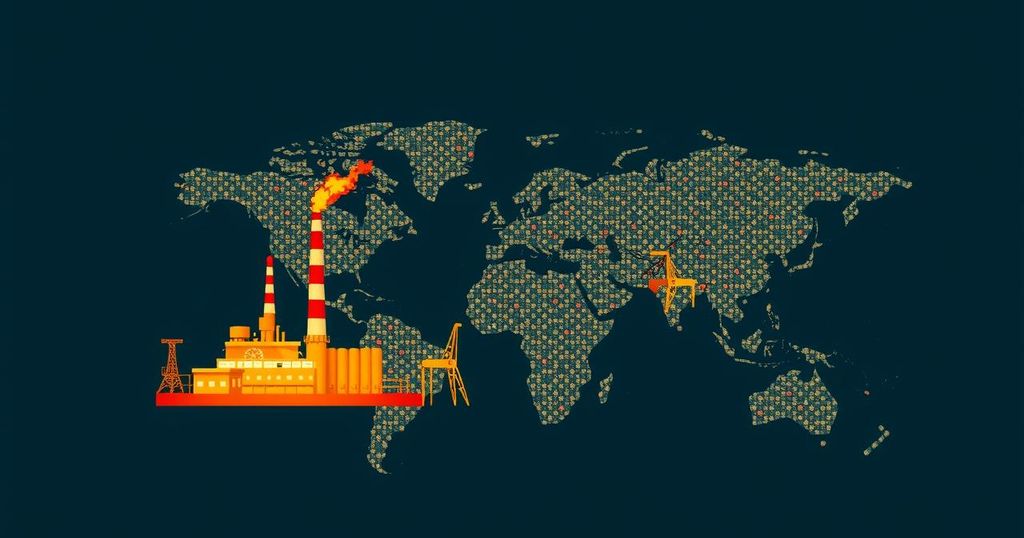The Fossil Fuel Industry’s Co-opting of UN Climate COPs: Five Key Strategies

The fossil fuel industry’s overrepresentation at COP29, with more than 1,770 lobbyists attending, threatens to undermine critical climate negotiations. Their tactics include lobbying, greenwashing, and evading financial responsibility, directing attention away from urgent climate action and disproportionately impacting vulnerable populations. Global leaders must resist these coercive influences to ensure the integrity and effectiveness of climate agreements.
The fossil fuel industry’s significant involvement at this year’s UN climate negotiations in Baku, Azerbaijan, raises numerous concerns regarding its influence on climate policies. With over 1,770 lobbyists, including CEOs from major oil and gas corporations, the industry’s numbers surpass almost every national delegation present, thereby potentially overshadowing the voices of vulnerable populations and Global South nations. The industry’s strong presence poses a threat to the core objectives of COP29, such as enhancing climate finance and promoting a rapid, equitable transition from fossil fuels. Furthermore, the fossil fuel industry employs methods like greenwashing and strategic lobbying that complicate progress toward important climate goals. The lobbyists’ presence reflects a systematic effort to ensure their interests are represented within the negotiation process, leading to calls for world leaders to resist such maneuvers. For instance, major oil corporations such as BP, Chevron, and ExxonMobil are actively participating, outnumbering delegates from climate-vulnerable countries. The continued access and engagement of these lobbyists at high-level events fuels skepticism regarding their role in advocating for necessary climate solutions. Additionally, the refusal of fossil fuel companies to take responsibility for climate finance exemplifies their prioritization of profits over environmental sustainability. The historical reliance on subsidies and tax incentives for fossil fuel companies compounds the difficulties faced by lower-income nations as they combat the impacts of climate change. Even during COP29, these companies have resisted calls to contribute fairly to the reparative financial mechanisms necessary for addressing climate-induced challenges. Simultaneously, the industry’s efforts to define clean energy transitions often focus on outdated technologies that fail to meet urgent climate targets, thereby hindering meaningful progress. Moreover, the industry utilizes greenwashing tactics to reshape narratives around climate action, diverting attention from their culpability in climate crises. Claims of advancing climate solutions often disguise the lack of substantive commitment toward emission reductions. Observations at COP29 indicate that these tactics not only persist in public discourse but also serve to undermine genuine climate advocacy by organizations striving for systemic change. Overall, the fossil fuel industry’s ongoing influence within climate talks highlights the pivotal need for global leaders to foster an equitable dialogue that prioritizes accountability and genuine transitions to clean energy. Institutional policies and litigative frameworks must evolve to curb the pervasive sway of fossil fuel corporations, ensuring that future climate negotiations remain focused on delivering equitable solutions to combat global warming and its adverse effects, particularly for the world’s most vulnerable populations.
The involvement of the fossil fuel industry at international climate negotiations, particularly during the COP sessions, raises urgent ethical and practical questions. These negotiations are designed to address the global climate crisis, but the substantial presence of fossil fuel lobbyists jeopardizes the integrity of discussions aimed at climate finance and transition efforts. The tactics employed by these corporations, such as greenwashing and securing high-level access, indicate a calculated approach to manipulate the process in favor of continued fossil fuel dependency, complicating efforts to achieve critical climate goals.
In conclusion, the fossil fuel industry’s extensive participation at COP29 underscores a significant obstacle to effective climate policy negotiations. Their overwhelming presence, combined with strategic lobbying efforts and attempts to influence the direction of discussions, poses serious risks to the integrity of climate agreements. It is imperative that global leaders and negotiators recognize these tactics and strive to center discourse on equitable solutions that do not permit fossil fuel interests to dominate. A focus on accountability and genuine climate action is essential to address the urgent challenges posed by climate change.
Original Source: blog.ucsusa.org






